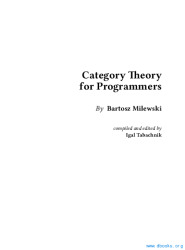Category Theory for Programmers
That's because, just like programming, category theory is about structure. Mathematicians discover structure in mathematical theories, programmers discover structure in computer programs. Well-structured programs are easier to understand and maintain and are less likely to contain bugs. Category theory provides the language to talk about structure and learning it will make you a better programmer.
Table of contents
-
Category: The Essence of Composition
-
Types and Functions
-
Categories Great and Small
-
Kleisli Categories
-
Products and Coproducts
-
Simple Algebraic Data Types
-
Functors
-
Functoriality
-
Function Types
-
Natural Transformations
-
Declarative Programming
-
Limits and Colimits
-
Free Monoids
-
Representable Functors
-
The Yoneda Lemma
-
Yoneda Embedding
-
It's All About Morphisms
-
Adjunctions
-
Free/Forgetful Adjunctions
-
Monads: Programmer's Definition
-
Monads and Effects
-
Monads Categorically
-
Comonads
-
F-Algebras
-
Algebras for Monads
-
Ends and Coends
-
Kan Extensions
-
Enriched Categories
-
Topoi
-
Lawvere Theories
-
Monads, Monoids, and Categories
| Pages : | 498 |
| Size : | 16.3 MB |
| File type : | |
| Downloads: | 115 |
| Created: | 2022-02-01 |
| License: | CC BY-SA |
| Author(s): | by Bartosz Milewski |

Warning: Trying to access array offset on false in /home/tutovnfz/public_html/article.php on line 233
Others Programmers Tutorials
Think Stats: Probability and Statistics for Programmers
97 Things Every Programmer Should Know: Collective Wisdom from the Experts
Others related eBooks about Category Theory for Programmers
Test-Driven Development with PythonDownload free course Test-Driven Development with Python, pdf file on 502 pages by Harry J. W. Percival....
Java Web Scraping HandbookDownload free course Java Web Scraping Handbook, pdf file on 115 pages by Kevin Sahin....
VB.NET a complet tutorial for beginnersThe purpose of this course is to provide a basic guide for student or people interested in Visual Basic dot net programming,it's a free training document for beginners....
Introduction to Microsoft Word 2010Download free training document in PDF intituled Introduction to Microsoft Word 2010, course on 159 pages for beginners....
Learning actionscript PDF courseDownload free Actionscript tutorial course in PDF, training file in 1 chapters and 6 pages. Free unaffiliated ebook created from Stack OverFlow contributor....
Graph AlgorithmsDownload free course Graph Algorithms, pdf file on 257 pages by Mark Needham, Amy Hodler....
You Don't Know JS Yet: Scope and ClosuresDownload free course You Don't Know JS Yet: Scope and Closures, pdf file on 279 pages by Kyle Simpson....
How to Build a SharePoint WebsiteDownload free SharePoint tutorial in pdf, training document on 11 pages for beginners....
Think Python - How to Think Like a Computer ScientistThink Python is an introduction to Python programming for students with no programming experience. It starts with the most basic concepts of programming, and is carefully designed to define all terms when they are first used and to develop each new concept in a logical progression. Larger pieces, ...
The Official Raspberry Pi Handbook 2022Download free course The Official Raspberry Pi Handbook 2022, pdf file on 204 pages by Wes Archer, David Crookes, PJ Evans, Gareth Halfacree, Rosie Hattersley, Phil King, Nicola King, KG Orphanides....